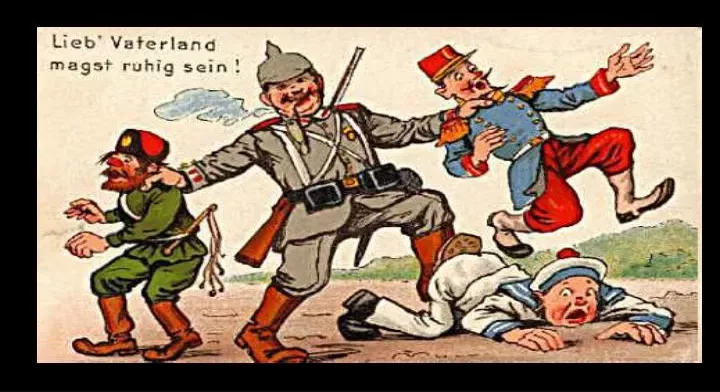Between WWI and WWII, Germans proudly sang their patriotic anthem Die Wacht am Rhein translated as “The Watch on the Rhine.” It contains the famous line, Lieb Vaterland, magst ruhig sein (seen in picture above) meaning “Dear Fatherland, be at peace.” That is, Germans believed that despite the loss of WWI, they could find the right captain to lead them to peace and victory. Everything was going to be fine… at all costs.
Alhough there is much debate to this day on how many Germans actually believed Hitler’s initial threats to the Jews, the fact is that it didn’t matter to most German gentiles. They were ready for a win, an easy win, a local win, any win at the hands of any unvetted hero who promised a quick “come-back.”
Before going any further, let me admit that there are many silly memes going around the internet today that say something like “Everyone I disagree with is literally Hitler.” And it is true that the knee-jerk reaction is to compare anyone you don’t like (eg Trump because he has a strong personality) to Hitler who also had a strong personality.
So, I’m going to try to avoid such a shallow and facile comparison in this article. Rather, I simply want to highlight how a vacuum of hope leads to trusting an unvetted hero after a time of loss, a time of embarrassment. Hitler showed his people signs of real hope at first, and the Germans were interested only in self-advancement instead of the global threat. That is what we need to consider.
Some historians to this day hold that Germans between the two World Wars couldn’t be blamed for their sense of desperation or hunger for unity. Those same historians also assert they couldn’t be blamed for seeking a man who would promise to unite them for a “come-back” following international ignominy. But Germans certainly can be blamed for not having believed their rising-star would keep his promises on war and who he would target for mass killing.
Similarly, Catholics are coming out of 13 years of shame in the Vatican following open worship of a Pachamama idol (a demon) as well as heretical documents commanding the blessing of same-sex couples (Fiducia Supplicans) and Amoris Laetitia (telling “re-married Catholics” to receive Holy Communion without an annulment) not to mention the TLM-crushing Traditionis Custodes and a thousand other heresies and scandals.
Thus, we ended the embarrassment of WWI, at least by analogy.
But now we welcome a new prelate who adheres to the United Nation’s Agenda 2030 (a world-wide sterilization program.)
There’s a dozen reasons the Holy Spirit did not “choose” an open-borders globalist, including what AB. Viganó wrote about illegal Conclaves here. So, today I blame the conservative Cardinals more than the liberal Cardinals for staying silent in the face of this madness. Our Lady of Good Success must have been warning the former when she said: “Those who should speak will fall silent.”
By analogy, WWII is going to be worse than WWI. The lesson from history is that we should always believe a leader when he telegraphs exactly what he’s going to do. A vacuum of supernatural hope usually causes a dizzying euphoria when the new chief arrives. But unity without truth will lead to a worse condition in the body than the original insult.
Finally, remember Germans were the most “obedient” people in history, even following illegal elections. So also, WWII is going to be a bigger humiliation than WWI for the neo-cons. When the Kanzler or Bill Gates or a UN-hire-in-a-fancy-mozzetta directly tells you who he is—believe him. Ecclesiological WWII is about to begin. You want to be on the right side of history.
